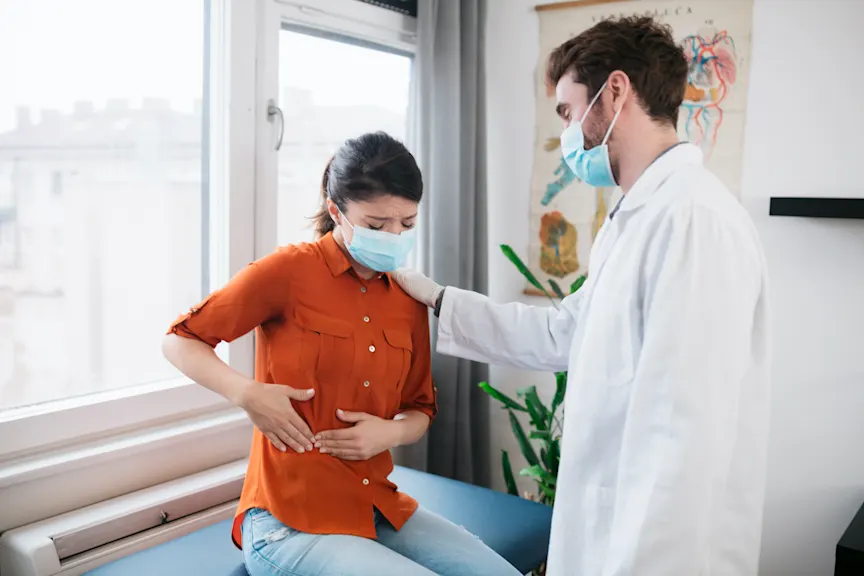COVID - 19期间的UC治疗计划
安全至关重要,但您的健康状况也是如此。这是如何拥有最好的两者。

的约在美国,有100万人患有溃疡性结肠炎(UC),制定一个可靠的持续护理计划并坚持下去,这可能意味着你是像老板一样日复一日地忙碌,还是总是担心附近有没有卫生间。UC是一种慢性肠道炎症,会影响结肠和直肠(组成大肠的部分)的内壁,并导致小溃疡或溃疡的形成。西雅图胃肠健康的胃肠病学家Praveen Guturu医学博士说:“发生的事情是免疫系统进入一个错误的反应,并与结肠作战。”他说,当结肠发炎时,会引起大便紧急、疲劳、频繁腹泻、大便粘液、血便和腹痛等症状,随着时间的推移,这些症状会加重。
Because UC is a chronic and often unpredictable condition, it won’t go away, but when you find (and stay on!) the right meds and check in with your doc regularly, it can become asymptomatic during periods of remission (these can span months or even years). However, every GI doc on the planet will tell you that even during times of remission it’s still important to continue taking your meds and going in for checkups. Which, in theory, all sounds like an easy plan during normal circumstances. Now throw in COVID, which has everyone avoiding doctor’s appointments like the plague and lapsing on regular care—a big no-no for anyone with IBD. To ease your angst, here’s what you need to know about routine care in the face of COVID.
看到你的医生。是的,在的人。
希望你能好好照顾自己病情也会得到缓解。如果真是这样的话,你应该每六个月去看一次医生——特别是监测血液检查并确保你的药物没有副作用,医学博士Siobhan Proksell说,迈阿密大学健康系统的胃肠病学家,迈阿密大学米勒医学院临床医学助理教授。然而,如果你正在经历突发症状或有任何新的迹象或症状,亲自体检是必要的,应该立即进行。“我们需要亲自去看医生,因为有些事情不做直肠或腹部检查是无法完成的,”古图鲁医生说。
对安全措施感到充满信心
我们完全让您可能担心亲本医生的约会。但知道这一点:办公室正在将阳光下的每一个安全措施放入常规方案,以使Covid威胁遥远的遏制。While every practice may have a slight variation in procedure (and you should call your own doc’s office to find out theirs), many, like the University of Miami Health System, are giving patients symptom-screening questionnaires even before entering the building, and administering temperature checks upon arrival, Dr. Proksell says. “Waiting rooms are set up in such a way that allow for patients to maintain adequate distance while waiting, staff are masked and maintaining appropriate social distance whenever possible, and each clinic room and associated equipment is be thoroughly cleaned after each patient visit,” she says. And what’s more, there’s the vaccine (praise!). “Healthcare providers have priority to receive the COVID-19 vaccine and the majority have already done so, further ensuring protection for both patient and provider,” Dr. Proksell says.
介意你的药物
普罗克斯尔博士说,坚持常规用药对于避免溃疡性结肠炎的发作和进一步并发症非常重要。她说:“基于迄今为止的研究,没有证据表明IBD患者对COVID-19的易感性增加,也没有发现用于治疗溃疡性结肠炎的药物对COVID-19患者的结果有负面影响。”然而,有一点需要注意。据研究人员称,服用免疫抑制药物的IBD患者通常更容易感染。具体来说,服用类固醇或免疫调节剂会增加IBD患者的病毒感染风险。然而,医生们一致认为,活跃的炎症比服药更有感染的风险,而不服药则有复发的风险。因此,医学界的共识是坚持你推荐的疗程。Proksell博士说:“如果你确实感染了COVID-19,请联系你的胃肠病学家,因为如果你生病了,我们可能会调整治疗的时间,或短暂保持治疗。”
- 关于加州大学:StatPearls。(2021)。“溃疡性结肠炎”。ncbi.nlm.nih.gov/books/nbk459282/
- UC&Covid:霍普金斯医学。“IBD患者指南:COVID-19”hopkinsmedicine.org/inflammatory_bowel_disease_center/covid-19-guidance.html
- COVID - 19期间IBD护理指南:克罗恩和结肠炎杂志杂志。(2020)。“COVID-19疫情期间炎症性肠病管理:ECCO-COVID -19工作组的十大应做和不应做的事情。”学术馆。ouve.com/ecco-jcc/article/14/supplement_3/s798/5877458





